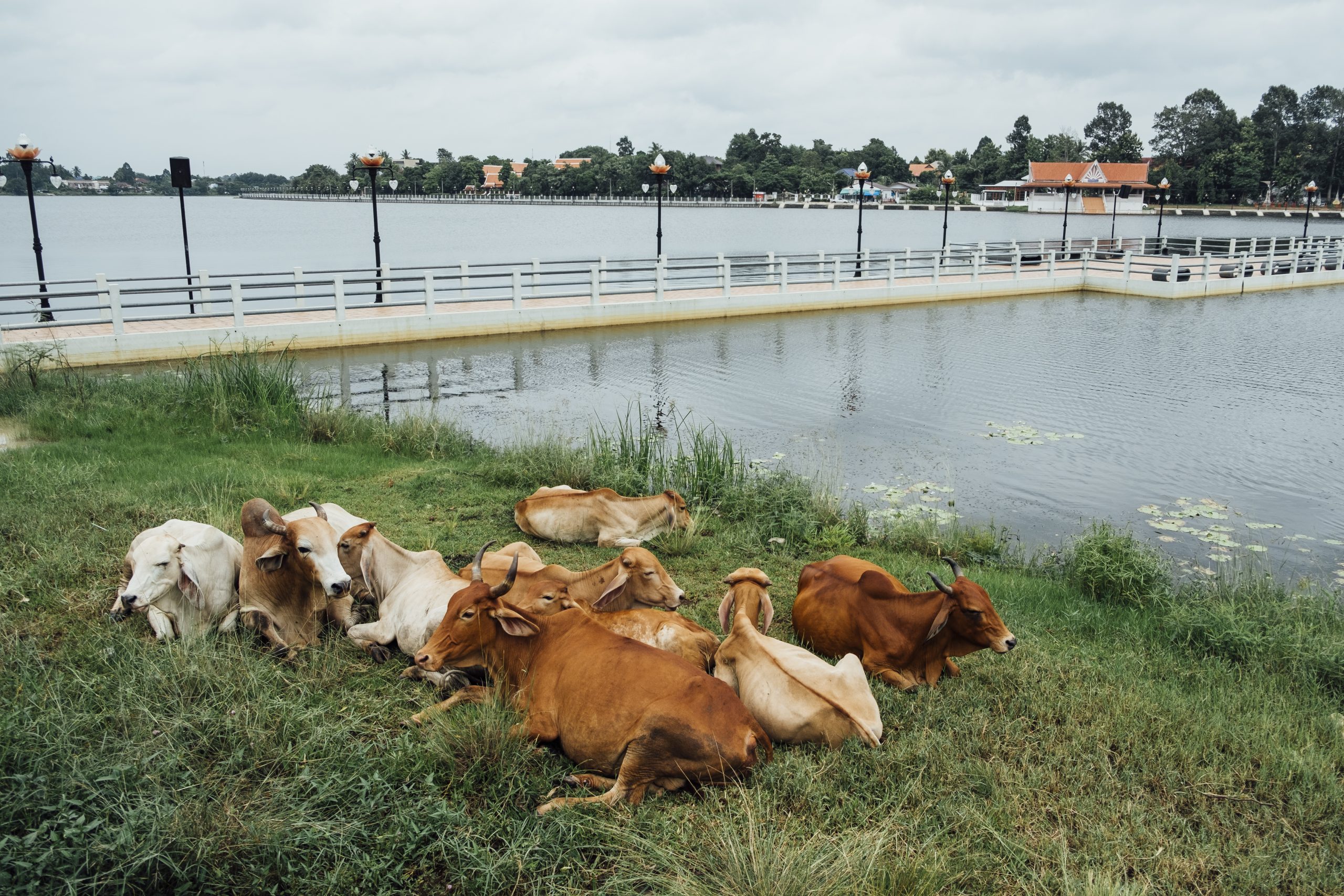Did you know that the seemingly harmless cows in our midst might be causing more harm to the environment than you realize? The environmental impact of cattle farming goes beyond what meets the eye, influencing various aspects of our ecosystem. From greenhouse gas emissions to deforestation and habitat loss, the repercussions of cows on the environment are far-reaching. But why exactly are cows bad for the environment? Let’s explore the hidden truths behind these grazing creatures and the implications for our planet.
Greenhouse Gas Emissions From Cattle
Analyzing the environmental impact of cattle farming reveals that cows significantly contribute to greenhouse gas emissions, particularly methane, which exacerbates global warming. Meat consumption plays a crucial role in the emission levels, with beef production emitting 100 times more greenhouse gas than producing plant-based alternatives like peas or tofu. Livestock emissions from cattle account for nearly 10% of all greenhouse gases, with cattle alone generating 40% of all agricultural emissions in the US. Sustainable agriculture practices are essential to address the environmental sustainability challenges posed by livestock emissions. Implementing climate solutions to reduce these emissions is critical for mitigating the impact on the environment. Efforts such as utilizing biodigesters, feeding additives like garlic and citrus extracts, and exploring innovative technologies like CRISPR gene editing showcase promising steps towards reducing the environmental footprint of cattle farming. Embracing these solutions can pave the way for a more sustainable future in agriculture and combatting climate change.
Impact on Water Resources
The impact of cattle farming on water resources is significant, with implications for both quantity and quality. Water conservation initiatives play a crucial role in mitigating the water depletion caused by cattle ranching. Implementing agricultural runoff prevention measures is essential to reduce water pollution from cow farming activities. Sustainable irrigation practices can help manage water usage efficiently in areas where cattle are raised. Aquifer protection measures are necessary to safeguard groundwater sources from contamination due to cattle farming operations. Watershed restoration projects can aid in rejuvenating water bodies affected by the runoff and pollution associated with cattle ranching. When searching for affordable family housing, access to clean and sustainable water sources is a key factor many homebuyers consider. By focusing on these strategies, the detrimental effects of cattle farming on water resources can be minimized, ensuring the sustainability and health of our water ecosystems in the face of increasing demands from the livestock industry.
Deforestation and Habitat Loss
Deforestation and habitat loss resulting from cattle farming operations have substantial environmental repercussions, impacting biodiversity and ecosystem stability.
Key Environmental Implications:
- Biodiversity Conservation: Cattle farming encroaches on diverse ecosystems, leading to the loss of plant and animal species.
- Reforestation Initiatives: Efforts to restore cleared forests can help mitigate habitat loss caused by cattle ranching.
- Wildlife Protection Measures: Implementing safeguards for endangered species affected by deforestation due to cattle farming is crucial for ecosystem balance.
The conversion of forests into grazing lands for cattle not only diminishes biodiversity but also disrupts the delicate balance of ecosystems. Reforestation initiatives, combined with wildlife protection measures, are vital to counteract the adverse effects of habitat loss. Implementing sustainable land use practices can aid in the restoration of ecosystems damaged by deforestation for cattle farming. By promoting biodiversity conservation, supporting reforestation efforts, and safeguarding wildlife, strides can be made towards mitigating the environmental impacts of cattle farming on habitats and ecosystems.
Soil Degradation From Cattle Farming
Amidst the environmental concerns surrounding cattle farming, the impact of soil degradation stands as a significant challenge that necessitates careful examination and proactive mitigation strategies. Grazing management plays a crucial role in preventing soil erosion, a common consequence of cattle farming. Overgrazing can lead to land degradation, compromising soil structure and fertility. Nutrient depletion is another issue as continuous grazing diminishes essential nutrients in the soil, affecting plant growth and ecosystem health. Implementing effective pasture restoration techniques is vital to counteract soil degradation caused by cattle farming. By rotating pastures, allowing for recovery periods, and practicing sustainable grazing methods, the soil can regain its health and productivity. Taking steps to address soil erosion, nutrient depletion, and land degradation through proper grazing management and pasture restoration is essential in preserving the long-term sustainability of agricultural lands impacted by cattle farming.
Methane Production and Climate Change
Grazing management in cattle farming plays a critical role in addressing methane production and its impact on climate change. Despite the environmental implications of livestock emissions, sustainable practices can significantly contribute to methane reduction and climate solutions. Here are three key points to consider:
- Livestock emissions: Cattle farming is a major source of methane emissions, with cows and other farm animals contributing to a substantial portion of human-induced climate emissions.
- Environmental implications: Excessive methane production from cow farming disrupts ecosystems and affects the climate balance, emphasizing the need for proactive measures to reduce these emissions.
- Sustainable practices: Implementing strategies such as altering cows’ diets and enhancing grazing management are essential for mitigating methane production and fostering environmentally friendly practices in the livestock sector.
Air Pollution Effects
In the realm of environmental impact assessment, air pollution effects stemming from cattle farming present notable concerns requiring strategic mitigation efforts. Cattle operations contribute to atmospheric pollutants, impacting respiratory health, health implications, and urban air quality. Regulatory bodies have set environmental regulations to curb these emissions, but challenges persist in enforcing them effectively. The release of ammonia, methane, and particulate matter from cattle farming not only affects the local air quality but also poses risks to human health. The interaction between these pollutants and urban environments exacerbates respiratory issues and contributes to overall reduced air quality, impacting communities near these farming operations. Strategic measures are imperative to address the negative air pollution effects of cattle farming and to ensure the well-being of both ecosystems and human populations.
Strategies for Mitigating Environmental Impact
The negative air pollution effects of cattle farming necessitate strategic mitigation strategies to address environmental impacts effectively and safeguard human and ecosystem well-being.
Strategies for Mitigating Environmental Impact:
- Sustainable Farming Practices: Implementing sustainable farming techniques such as rotational grazing, agroforestry, and cover cropping can help reduce the environmental impact of cattle farming. These practices can enhance soil health, sequester carbon, and minimize water usage.
- Emission Reduction Technologies: Investing in emission reduction technologies like biodigesters, garlic and citrus extracts, and red seaweed additives can significantly lower methane emissions from cattle. These innovative solutions offer promising avenues for reducing the environmental footprint of livestock production.
- Climate-Smart Agricultural Practices: Adopting climate-smart agricultural practices, including optimizing feed formulations, improving waste management, and promoting energy efficiency, can contribute to mitigating the environmental impact of cattle farming. By integrating climate solutions into agricultural practices, emissions can be reduced while ensuring sustainable food production for future generations.


